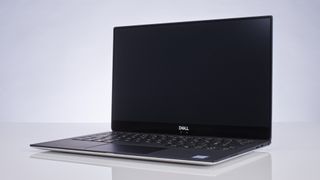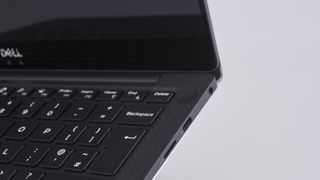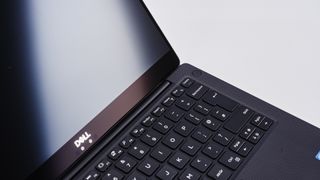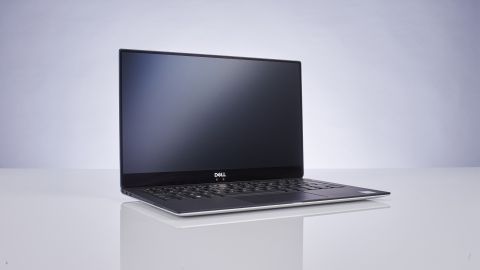Why you can trust TechRadar
Usage and performance
The XPS 13 Developer Edition, which ships with Ubuntu 16.04 LTS out of the box, is a very powerful laptop. We threw some of our most demanding development tasks at it – compiling Android from scratch is one of our favorites – and the extra horsepower provided by the quad-core CPU meant a considerable performance improvement over its predecessor.

Even better, Dell appears to have equipped the 9370 with vastly improved thermals, with the fan much less likely to kick in than on its predecessor, a common complaint. Another gripe of XPS users is coil whine which was absent on our test unit (although it was notoriously patchy on earlier devices too).
On a daily basis, the 9370 is a very easy device to live with. It offers fantastic portability, blistering performance, and is great to use with its incredible screen and comfortable keyboard, along with good Wi-Fi connectivity. Aside from an occasional grumble when needing to connect a USB-A device, there’s really not a lot to dislike about this machine – provided you don’t plan on using the webcam too often.

The laptop is a product of Project Sputnik, Dell’s own well established Ubuntu effort, so as you would expect, we encountered no issues with software at all either on the supplied LTS distro, or by updating to the latest non-LTS release. We also installed a number of alternative distros and again we didn’t see any issues.
Here’s how the Dell XPS 13 Developer Edition 9370 performed in the Phoronix Test Suite complex system test:
Apache: Static web page serving: 27120.47
C-Ray: Total time: 37.80
Ramspeed fp: 16104.05
Ramspeed int: 16463.21
Postmark: Disk transaction performance: 2186
We mentioned above that the battery capacity has been reduced slightly for this revision, but in our testing we saw little to no appreciable change in longevity. A full work day is easy meat for the machine and you can likely even get a decent length of commute in away from the charger, too. Given the dimensions and the horsepower inside of this notebook, we think this is a mightily impressive feat.
What we found particularly impressive when benchmarking was the low deviation from the best scores across multiple tests. This supports our findings that thermals are much improved on the 9370, leading to reducing throttling at high loads.
Competition
If you want to buy a laptop with Linux out of the box, and get the level of manufacturer support that comes with that, then there is literally nothing that’s comparable to the XPS 13 Developer Edition. System76 does have some options, but none that pack the same wow factor as the 9370.
From a purely hardware perspective, the latest Lenovo Yoga 920 is a solid contender, the Surface Laptop is comparable, and the HP Spectre x360 is often mentioned alongside the Dell.

Final verdict
Dell has done a great job with the 9370. Aside from the ongoing issue with the oddly placed webcam (which we really hope is changed in the next generation), the XPS 13 Developer Edition is as close to the perfect notebook as exists today.
If we were to be picky we’d note that the touchscreen is largely wasted on Linux users and LTE support would be a nice option (particularly with Microsoft adding it to the Surface range), but when it comes to laptops with Linux pre-installed, there’s simply nothing that compares.
Buyers do need to embrace the brave new USB-C world thanks to the deletion of the USB-A ports, and you’re likely to end up carrying an adaptor with you – perhaps one for Ethernet and HDMI, too. The real selling point of the 13-inch XPS is its size and weight, but if this is less of a concern then Dell also offers Linux laptops based on the 15-inch XPS chassis, although not with the 8th-generation Intel processors as yet.
One final thought as to whether the Developer Edition itself is the model to go for: if you want white or a 1TB drive installed, you can easily buy the Windows notebook, install Ubuntu and add the Dell repos yourself. In this case, you effectively end up shelling out £50 ($70) for the Windows licence, but still, at least you have the choice. You also get a fingerprint reader that while not supported in Linux, will work if you are a user who dual-boots – and it may be supported at some point in the future.
- We’ve picked out the best business laptops of 2018

Steve Jobs was wrong about the post-PC era and the next batch of iPads should embrace this

Soundcore's new sports earbuds offer a Powerbeats Pro-style customizable secure fit for a fraction of the price

Meta’s massive OS announcement is more exciting than a Meta Quest 4 reveal, and VR will never be the same again
